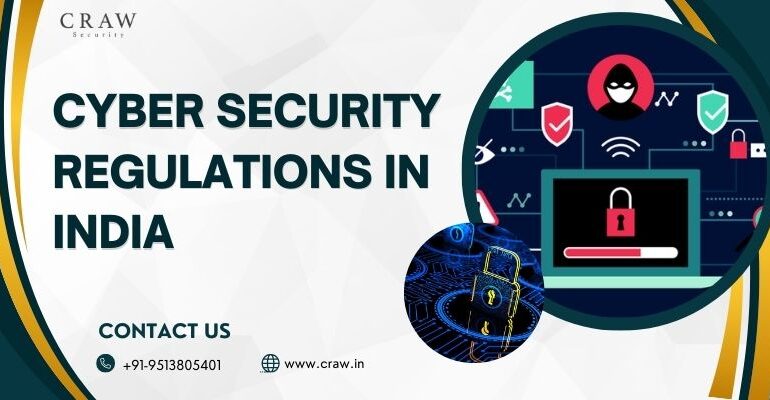Cyber Security Regulations in India [2025]

Cyber Security Regulations in India [2025]
Cyber Security Regulations in India
Introduction
Because of society’s increasing reliance on technology, robust cybersecurity measures are now crucial. India, one of the world’s fastest-growing digital economies, is aware of how critical it is to protect its online reputation. In 2025, new legislation was implemented to strengthen the country’s cyber security framework. Under India’s 2025 cyber security regulations, this article looks at the key components, ramifications, and steps taken to provide a more secure online environment.
Understanding Cyber Security Regulations
Policies designed to prevent unauthorized access, use, disclosure, disruption, alteration, and destruction of data and information systems are known as cybersecurity laws and regulations. These rules are intended to establish a minimal set of security guidelines and practices that businesses must follow in order to lower the risks associated with cyberattacks. Businesses need to be aware of cybersecurity laws in order to stay in compliance and safeguard their digital assets.
Evolution of Cyber Security in India
Over the years, India’s cybersecurity landscape has seen substantial advancements. The majority of instances involving cyber scams have increased in the last few years, both domestically and internationally, particularly in the post-coronavirus pandemic years.
Below is a summary of India’s most significant cybersecurity efforts and accomplishments:
- Formation of CERT-In in 2004,
- Information Technology (IT) Act, 2000,
- National Cyber Security Policy, 2013,
- Cyber Swachhta Kendra (Botnet Cleaning and Malware Analysis Centre) in 2017,
- Data Protection and Privacy Regulations in 2017,
- National Critical Information Infrastructure Protection Centre (NCIIPC),
- Cybersecurity Cooperation and International Engagements,
- Skill Development Initiatives,
- Sector-Specific Regulations,
- Cybersecurity Awareness Initiatives, etc.
Key Provisions of the Cyber Security Regulations in India 2025
- Mandatory Data Localization
- Strengthened Data Protection Laws
- Incident Reporting and Response
- Cyber Security Audits and Compliance
- National Cyber Security Agency
- Critical Information Infrastructure Protection
Implications of the Cyber Security Regulations
The Indian government has gone to great lengths to enforce the country’s major cyber security laws in an effort to stop the growing number of horrific cyberattacks. Together with the Department of Cyber Cell, the local police have dismantled numerous gangs that were operating illegally throughout the nation and robbing innocent people using their strategies, tools, and methods.
Additionally, the following are some well-known approaches for the implications of the cyber security regulations:
| Protection of Personal Data | Safeguarding the confidentiality and integrity of individuals’ personal data is known as “protecting personal data.” The rapid advancement of digital technology and online services has increased the importance of protecting personal data. |
| Safeguarding National Security | In the digital age, cybersecurity is a crucial component of national security. Protecting government networks, critical infrastructure, and sensitive data from cyberattacks is essential. Effective cybersecurity measures, incident response capabilities, and cybersecurity awareness promotion should all be put into place to safeguard national security against new cyber threats. |
| Promoting Digital Trust and Confidence | Promoting digital trust and confidence is essential in the current world when individuals, groups, and governments primarily rely on digital technologies and online interactions. People’s assurance and comfort regarding the safety, confidentiality, and dependability of digital systems, services, and transactions is known as “digital trust.” Building digital trust and confidence is essential to the growth of the digital economy and the effective use of digital technology. |
| Enhancing International Cooperation | Improving international cooperation is crucial for addressing global issues, advancing peace and stability, and fostering economic growth. In the current globalized world, nations, businesses, and individuals are more interconnected than ever. |
Steps Taken by the Indian Government
By implying that India has world-class cyber security laws, the Indian government has generally taken a lot of preventive measures to ensure the general public’s overall security in the context of cyber security. The following are some of the primary actions the Indian government has done in relation to cyber security:
- Public Awareness Campaigns,
- Collaboration with Industry Experts,
- Capacity Building Initiatives, etc.
Challenges and Future Outlook
By implementing the appropriate preventive measures linked to the Cyber Security Regulations in India, a significant number of difficulties exist in the wild that indicate the future perspective of cyber security in India. Additionally, the following table lists some of the difficulties encountered and the prospects for the future:
| Balancing Privacy and Security | Finding a balance between privacy and security is a persistent problem in the present digital world. While privacy refers to a person’s right to control their personal information, security encompasses protecting individuals and society against threats and attacks. Finding the right balance between these two crucial elements is essential to maintaining civil liberties, guaranteeing public safety, and fostering trust in digital interactions. |
| Addressing Technological Advancements | It is crucial to handle technological advancements in order to manage the advantages and difficulties posed by the rapid pace of technological change. Business, governance, communication, and everyday life are just a few of the areas of society that technological advancements have the potential to drastically alter. |
| International Alignment of Regulations | One term for the harmonization and coordination of regulatory systems across countries and regions is “international alignment of regulations.”
Encourage cooperation, trade, and consistency in regulatory operations by implementing universal standards, guidelines, and norms. |
FAQs
About Cyber Security Regulations in India 2025
1: What is the regulation of cybersecurity?
“Cybersecurity regulation” refers to the laws, rules, and guidelines that govern the defense of data, networks, and information systems against online threats. The purpose of cybersecurity guidelines is to provide a set of best practices and standards that companies must follow to safeguard their digital assets and lower the risks associated with assaults.
2: Does India have a cyber security Act?
India does not have a comprehensive cybersecurity act. Nonetheless, regulations pertaining to cybersecurity and cybercrime are included in India’s Information Technology (IT) Act of 2000. The IT Act of 2000 was revised in 2008 to address emerging cyber threats and challenges.
3: What are the cyber security regulations 2025?
As of right now (2025), there are no new cybersecurity regulations. Nonetheless, a plethora of cyber security laws have been put into effect thus far, some of which are listed below:
- Formation of CERT-In in 2004,
- Information Technology (IT) Act, 2000,
- National Cyber Security Policy, 2013,
- Cyber Swachhta Kendra (Botnet Cleaning and Malware Analysis Centre) in 2017,
- Data Protection and Privacy Regulations in 2017,
- National Critical Information Infrastructure Protection Centre (NCIIPC),
- Cybersecurity Cooperation and International Engagements,
- Skill Development Initiatives,
- Sector-Specific Regulations,
- Cybersecurity Awareness Initiatives, etc.
4: Who regulates cyber crime in India?
Indian Computer Emergency Response Team (CERT-In) handles all kinds of matters related to cybercrime in India.
5: What are the five laws of cybersecurity?
The 5 laws of cybersecurity are as follows:
- Confidentiality,
- Integrity,
- Availability,
- Authentication, and
- Non-Repudiation.
6: What is Act 2000 of India?
The Act 2000 is the abbreviation for the Information Technology Act, 2000 of India. This comprehensive piece of legislation was passed by the Indian Parliament in order to solve cybersecurity and cybercrime issues, promote e-governance, and legalize electronic transactions.
7: What are the three rules of cyber security?
The mainstream 3 rules of cyber security are mentioned below:
- Confidentiality,
- Integrity, and
- Availability.
8: How many cyber security standards are there?
The prominent cyber security standards are given below:
- ISO/IEC 27001,
- NIST Cybersecurity Framework,
- CIS Controls,
- PCI DSS,
- HIPAA,
- GDPR,
- IEC 62443, etc.
9: How many cyber security levels are there?
There is no predetermined number of cybersecurity levels because it may vary depending on the circumstances and the specific framework or model used. Several cybersecurity frameworks and maturity models divide cybersecurity into various levels or stages in order to assess an organization’s cybersecurity posture. These phases are commonly used to assess the maturity of an organization and guide its progress toward a stronger cybersecurity posture.
10: What are the 7 layers of cyber security?
The 7 layers of cyber security are mentioned below:
- Physical Security.
- Perimeter Security,
- Network Security,
- Endpoint Security,
- Application Security,
- Data Security,
- User Education and Awareness, etc.
11: How can individuals protect themselves from cyber threats?
There are numerous actions people can take to safeguard themselves from online attacks, such as the following:
- Use Strong and Unique Passwords,
- Enable Two-Factor Authentication (2FA),
- Keep Software and Devices Updated,
- Be Cautious with Emails and Phishing Attacks,
- Use Secure Wi-Fi Networks,
- Regularly Back Up Your Data,
- Be Mindful of Social Media and Online Sharing,
- Install and Maintain Security Software,
- Be Skeptical of Unsolicited Requests or Offers,
- Stay Informed and Educated, etc.
12: Are there specific regulations for securing critical information infrastructure?
India’s National Critical Information Infrastructure Protection Centre (NCIIPC) is responsible for safeguarding CIIs. In addition to naming and designating CIIs, the NCIIPC establishes guidelines and protocols for their protection.
13: Is there any provision for cross-border data transfer under the cyber security regulations?
Yes, many cyber security regulations include provisions for cross-border data transfers that ensure the secure and lawful transfer of personal information. These provisions frequently defend individuals’ rights to privacy and the security of their personal data while also ensuring that data transfers comply with legal mandates.
Conclusion
To wrap up, we would like to say that the main cyber security regulations in India that have been implemented throughout the years in the country are very effective and have helped a lot to all common users. In addition, you can learn all the fundamentals of cyber security with the help of this mesmerizing course, namely the 1-Year Cyber Security Diploma by Craw Security, the Best Cybersecurity Training Institute in India. Call +91-9513805401 to know more by having a word with our highly skilled and experienced team of educational counselors.
















